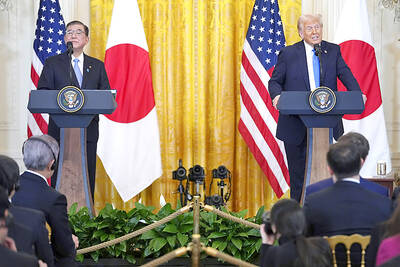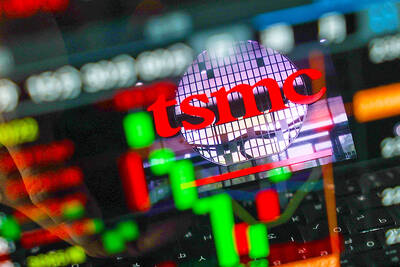Chunghwa Post is today to launch a co-branded Visa debit card with EasyCard Corp that also functions as an EasyCard, enabling cardholders to use it to ride public buses and rail systems nationwide, as well as pay for items at convenience stores and supermarkets.
This is the first time that the postal company has launched a co-branded card with a different business.
The card’s design features homing pigeons, with which people used to deliver messages, Chunghwa Post said.

Photo courtesy of Chunghwa Post
When paying for items, cardholders can choose to pay with the money stored in the EasyCard account or with the Visa debit card, with both accounts being linked to their Chunghwa Post checking or savings accounts, it said.
Cardholders can adjust the card’s settings so that NT$500 or more would be automatically added to their EasyCard account if it does not contain enough funds to pay for transportation or items they want to buy, the postal company said.
However, if their postal savings or checking account has less than NT$100 in it they can still add funds to their EasyCard using the machines at MRT stations, it said.
The amount of money that can be automatically added to the EasyCard account is capped at NT$3,000 per day, and the total amount that can be stored on the card is capped at NT$10,000.
Chunghwa Post said that it hoped that the co-branded cards would increase its number of Visa debit card users, which has grown slowly over the past 10 years.
Statistics from the postal company showed that it has about 4.13 million Visa debit card holders since it launched the card in September 2009.
From Jan. 16, the company’s other debit card holders can use their card to pay for fares on the Kaohsiung MRT system and the Taoyuan Airport MRT line.

The US-Japan joint statement released on Friday not mentioning the “one China” policy might be a sign that US President Donald Trump intends to decouple US-China relations from Taiwan, a Taiwanese academic said. Following Trump’s meeting with Japanese Prime Minister Shigeru Ishiba on Friday, the US and Japan issued a joint statement where they reaffirmed the importance of peace and stability in the Taiwan Strait and support for Taiwan’s meaningful participation in international organizations. Trump has not personally brought up the “one China” policy in more than a year, National Taiwan University Department of Political Science Associate Professor Chen Shih-min (陳世民)

‘NEVER!’ Taiwan FactCheck Center said it had only received donations from the Open Society Foundations, which supports nonprofits that promote democratic values Taiwan FactCheck Center (TFC) has never received any donation from the US Agency for International Development (USAID), a cofounder of the organization wrote on his Facebook page on Sunday. The Taipei-based organization was established in 2018 by Taiwan Media Watch Foundation and the Association of Quality Journalism to monitor and verify news and information accuracy. It was officially registered as a foundation in 2021. National Chung Cheng University communications professor Lo Shih-hung (羅世宏), a cofounder and chairman of TFC, was responding to online rumors that the TFC receives funding from the US government’s humanitarian assistance agency via the Open Society Foundations (OSF),

ANNUAL LIGHT SHOW: The lanterns are exhibited near Taoyuan’s high-speed rail station and around the Taoyuan Sports Park Station of the airport MRT line More than 400 lanterns are to be on display at the annual Taiwan Lantern Festival, which officially starts in Taoyuan today. The city is hosting the festival for the second time — the first time was in 2016. The Tourism Administration held a rehearsal of the festival last night. Chunghwa Telecom donated the main lantern of the festival to the Taoyuan City Government. The lanterns are exhibited in two main areas: near the high-speed rail (HSR) station in Taoyuan, which is at the A18 station of the Taoyuan Airport MRT, and around the Taoyuan Sports Park Station of the MRT

An alleged US government plan to encourage Taiwan Semiconductor Manufacturing Co (TSMC) to form a joint venture with Intel to boost US chipmaking would place the Taiwanese foundry giant in a more disadvantageous position than proposed tariffs on imported chips, a semiconductor expert said yesterday. If TSMC forms a joint venture with its US rival, it faces the risk of technology outflow, said Liu Pei-chen (劉佩真), a researcher at the Taiwan Industry Economics Database of the Taiwan Institute of Economic Research. A report by international financial services firm Baird said that Asia semiconductor supply chain talks suggest that the US government would